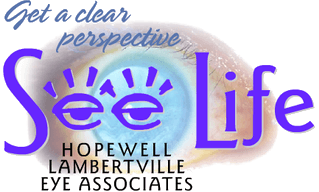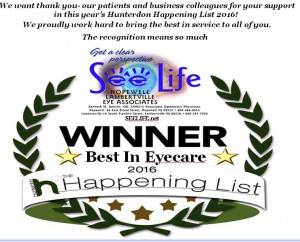Nutritional Supplements For Eye and Whole Body Health
Nutritional supplements are critical in complementing your dietary habits to compensate for the essential nutrients that are need to maintain good health, metabolism and systemic homeostasis.
It is best practice to seek the advise of your physician(s) at Hopewell Lambertville Eye, whom will work with your other physicians to prescribe the most appropriate supplements to assist in the prevention and control of retinal disease such as macular degeneration, diabetic or hypertensive retinopathy, dry eye , glaucoma and other disorders.
The eyes can tell us much about your systemic well - being with the proper nutrition complemented with supplements can assure better health and preservation of vision.

You may be taking more risks than you realize with certain supplements. As we have seen a rash of eye care products of poor quality recalled (sold at common retailers and online), it is important to seek the advise of your doctors and the eye physicians at Hopewell Lambertville Eye
https://www.everydayhealth.com/news/supplements-risks-every-women-should-know/
For your safety, Hopewell Lambertville Eye have recommended supplements available in our offices and via our online stores at : Ocular Protect (AREDS whole body) , HydroEyes (Dry Eye) , Omega Advance (Omega 3) , Diavis (diabetes) and more...
Hopewell Lambertville Eye Online Store
 10% Discount CodesHopewell10 (or) Lambertville10
10% Discount CodesHopewell10 (or) Lambertville10
Hopewell Lambertville Eye : Dry Eye Rescue
Read more at Nutrition and Eyes on the Hopewell Lambertville Eye blogs.
===========================================================================================
The following is from the NIH (with some modifications)
AREDS/AREDS2 Frequently Asked Questions
https://ods.od.nih.gov/factsheets/WYNTK-Consumer/
Many adults and children in the United States take one or more vitamins or other dietary supplements. In addition to vitamins, dietary supplements can contain minerals, herbs or other botanicals, amino acids, enzymes, and many other ingredients. Dietary supplements come in a variety of forms, including tablets, capsules, gummies, and powders as well as drinks and energy bars. Popular supplements include vitamins D and B12; minerals like calcium and iron; herbs such as echinacea and garlic; and products like glucosamine, probiotics, and fish oils.
The Dietary Supplement Label
Products sold as dietary supplements come with a Supplement Facts label that lists the active ingredients, the amount per serving (dose), and other ingredients, such as fillers, binders, and flavorings. The manufacturer suggests the serving size, but your health care provider might decide a different amount is more appropriate for you.
Effectiveness
Some dietary supplements can help you get adequate amounts of essential nutrients if you don’t eat a nutritious variety of foods. However, supplements can’t take the place of the variety of foods that are important to a healthy eating routine. To learn more about what makes a healthy eating routine, the Dietary Guidelines for Americans![]() and MyPlate
and MyPlate![]() are good sources of information.
are good sources of information.
Some dietary supplements can improve overall health and help manage some health conditions. For example:
- Calcium and vitamin D help keep bones strong and reduce bone loss.
- Folic acid decreases the risk of certain birth defects.
- Omega-3 fatty acids from fish oils might help some people with heart disease and ophthalmic concerns in retinal circulation and dry eye
- A combination of vitamins C and E, zinc, copper, lutein, and zeaxanthin (known as an Age-Related Eye Disease Study [AREDS] formula) may slow down further vision loss in people with age-related macular degeneration (AMD).

https://www.researchgate.net/figure/The-original-AREDS1-and-AREDS2-formulations_tbl2_327165725
Refer to the following link for detail FAQ on AREDS - Macular Degenerations: AREDS / AREDS 2
Many other supplements need more study to determine if they have value. The U.S. Food and Drug Administration (FDA) does not determine whether dietary supplements are effective before they are marketed.
Safety and Risk
Any thing that goes into your mouth is a form of a medication. Any thing that goes into your mouth and digestive, cardiac, vascular, neurological... systems has a effect.
Your physician(s) should educate you on proper dosing. Mega dosing at one session does not allow for the proper digestion of the supplement. As you would take prescribed medications on a set schedule as you should supplements. Taking all at one time or a poor quality preparation may not be properly metabolized and can cause side effects, gastric distress,... and is not fully absorbed thus " you will pee or poop it out before you actually get a benefit."
Many supplements contain active ingredients that can have strong effects on the body. Always be alert to the possibility of a bad reaction, especially when taking a new product.
You are most likely to have side effects from dietary supplements if you take them at high doses, or instead of prescribed medicines, or if you take many different supplements. Some supplements can increase the risk of bleeding or, if taken before surgery, can change your response to anesthesia. Supplements can also interact with some medicines in ways that might cause problems. Here are a few examples:
- Vitamin K can reduce the ability of the blood thinner warfarin to prevent blood from clotting.
- St. John’s wort can speed the breakdown of many medicines and reduce their effectiveness (including some antidepressants, birth control pills, heart medications, anti-HIV medications, and transplant drugs).
- Antioxidant supplements, such as vitamins C and E, might reduce the effectiveness of some types of cancer chemotherapy.
- Red Rice Yeast natural statin to control cholesterol but also mimics statins medications. Should be taken in balance to to statins and only with consult with your physician.
- Grapeseed extract - GSE effective in fatty liver disease, can protect the retina protects the retina against early diabetic injury by activating the Nrf2 pathway, can reduce blood pressure via renal functions, are similar to pharmaceutical aromatase inhibitors (AIs). These procyanidin dimers have been found to suppress estrogen biosynthesisis generally and should not be used during chemotherapy. GSE is considered safe with few side effects. Dosages of around 300–800 mg per day for 8–16 weeks have been found to be safe and well tolerated in humans. Common side effects include nausea, itching, dizziness, stomach upset, diarrhea, headache, sore throat, cough, and rash. Pregnant or breastfeeding women should not take grape seed supplements.
- Resveratrol (acquired through skin of grapes i.e. grape juices, red > white wine) has beneficial effects in preventing cataracts, glaucoma, age-related macular degeneration - diabetic retinopathy(*anti - vegf (vascular epithelial growth factor)) , uveitis, and dry eye, as well as antitumor, anti-inflammatory and neuro -protective (i.e. dementia) properties. Resveratrol - Ophthalmic and Systemic Benefits; The Role of Resveratrol in Eye Diseases—A Review of the Literature
- Curcumin (Tumeric) : has similar functionality as Resveratrol and should not be taken together due to an additive effect. neuroprotective effect of turmeric (rhizome of Curcuma longa L.), the main source of curcumin. preventing free radical accumulation like advanced glycation end products (AGEs) and eventually reducing glaucoma, macular degeneration disorder, retinal detachment, uveitis and diabetic retinopathy. It is also used to treat a wide variety of inflammatory diseases including cancer, diabetes, cardiovascular diseases, arthritis, Alzheimer's disease, psoriasis, .. AGE's can be measured with a instrument called Clearpath available in the office at Clearpath at Hopewell Lambertville Eye
-
ClearPath Diabetes Screener

The ClearPath device measures the amount of sugar within the lens of the eye. A higher value of sugar in the lens equates to a higher blood sugar level. ClearPath has been shown to detect your diabetic risk up to 7 years in advance of abnormal blood findings associated with vascular disease. The technology complements A1c measures but as well is consider a more specific – sensitive measure using AGE (advanced glycosylated end-product).
Manufacturers may add vitamins, minerals, and other supplement ingredients to foods you eat, especially breakfast cereals and beverages. As a result, you may get more of these ingredients than you think, and more might not be better. Taking more than you need costs more and might also raise your risk of side effects. For example, too much vitamin A can cause headaches and liver damage, reduce bone strength, and cause birth defects. Excess iron causes nausea and vomiting and may damage the liver and other organs.
Be cautious about taking dietary supplements, beyond a standard prenatal supplement, if you are pregnant or nursing. Also, be careful about giving supplements to a child, unless recommended by their health care provider. Many supplements have not been well tested for safety in children and in those who are pregnant or nursing.
If you think that you have had a bad reaction to a dietary supplement, let your health care provider know. They may report your experience to FDA. You may also submit a report directly to FDA by calling 800-FDA-1088 or completing an online form![]() . You should also report your reaction to the manufacturer by using the contact information on the product label.
. You should also report your reaction to the manufacturer by using the contact information on the product label.
Quality
FDA has established Good Manufacturing Practices (GMPs) that companies must follow to help ensure the identity, purity, strength, and composition of their dietary supplements. These GMPs can prevent adding the wrong ingredient (or too much or too little of the correct ingredient) and reduce the chance of contamination or improper packaging and labeling of a product. FDA periodically inspects facilities that manufacture supplements.
Several independent organizations offer quality testing and allow products that pass these tests to display a seal of quality assurance that indicates the product was properly manufactured, contains the ingredients listed on the label, and does not contain harmful levels of contaminants. These seals do not guarantee that a product is safe or effective. Organizations that offer quality testing include:*
- ConsumerLab.com
- NSF International
- U.S. Pharmacopeia (USP)
* Any mention of a specific company, organization, or service does not represent an endorsement by ODS.
Talk with Your Health Care Providers
Tell your health care providers (including doctors, Hopewell Lambertville Eye, dentists, pharmacists, and dietitians) about any dietary supplements you’re taking. They can help you determine which supplements, if any, might be valuable for you.
Keep a complete record of any dietary supplements and medicines you take. The Office of Dietary Supplements website has a useful form, My Dietary Supplement and Medicine Record, that you can print and fill out at home. For each product, note the name, the dose you take, how often you take it, and the reason for use. You can share this record with your health care providers to discuss what’s best for your overall health.
Keep in Mind
- Consult your health care provider before taking dietary supplements to treat a health condition.
- Get your health care provider’s approval before taking dietary supplements in place of, or in combination with, prescribed medicines.
- If you are scheduled to have any type of surgical procedure, talk with your health care provider about any supplements you take.
- Keep in mind the term natural doesn’t always mean safe. Some all-natural botanical products, for example comfrey and kava, can harm the liver. A dietary supplement’s safety depends on many things, such as its chemical makeup, how it works in the body, how it is prepared, and the amount you take.
- Before taking any dietary supplement, use the information sources listed in this fact sheet and talk to your health care providers to answer these questions:
- What are its potential benefits for me?
- Does it have any safety risks?
- What is the proper dose to take?
- How, when, and for how long should I take it?
Federal Regulation of Dietary Supplements
Dietary supplements are products intended to supplement the diet. They are not medicines and are not intended to treat, diagnose, mitigate, prevent, or cure diseases. FDA is the federal agency that oversees both supplements and medicines, but FDA regulations for dietary supplements are different from those for prescription or over-the-counter medicines.
Medicines must be approved by FDA before they can be sold or marketed. Supplements do not require this approval. Supplement companies are responsible for having evidence that their products are safe, and the label claims are truthful and not misleading. However, as long as the product does not contain a new dietary ingredient (one introduced since October 15, 1994), the company does not have to provide this safety evidence to FDA before the product is marketed.
Dietary supplement labels may include certain types of health-related claims. Manufacturers are permitted to say, for example, that a supplement promotes health or supports a body part or function (like heart health or the immune system). These claims must be followed by the words, “This statement has not been evaluated by the Food and Drug Administration. This product is not intended to diagnose, treat, cure, or prevent any disease.”
Manufacturers must follow GMPs to ensure the identity, purity, strength, and composition of their products. If FDA finds a dietary supplement to be unsafe, it may remove the product from the marketplace or ask the manufacturer to voluntarily recall the product.
FDA monitors the marketplace for potential illegal products that may be unsafe or make false or misleading claims. The Federal Trade Commission, which monitors product advertising, also requires information about a supplement product to be truthful and not misleading.
The federal government can take legal action against companies and websites that sell dietary supplements when the companies make false or deceptive statements about their products, if they promote them as treatments or cures for diseases, or if their products are unsafe.
For more information on supplements use the Dietary Supplement Ingredient Directory, a web page intended to help the public stay informed about the ingredients used in dietary supplements.
For more information and to schedule an appointment call or email a request :
Hopewell Eye: 609-466-0055 Lambertville Eye: 609-397-7020 hopewelleye@kennethdaniels.net





